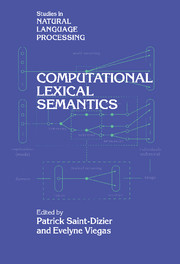Book contents
- Frontmatter
- Contents
- List of contributors
- Preface
- 1 An introduction to lexical semantics from a linguistic and a psycholinguistic perspective
- Part I Psycholinguistics for lexical semantics
- Part II Foundational issues in lexical semantics
- Part III Lexical databases
- Part IV Lexical semantics and artificial intelligence
- Part V Applications
- Part VI Computer models for lexical semantics
- Author index
- Subject index
Part V - Applications
Published online by Cambridge University Press: 29 September 2009
- Frontmatter
- Contents
- List of contributors
- Preface
- 1 An introduction to lexical semantics from a linguistic and a psycholinguistic perspective
- Part I Psycholinguistics for lexical semantics
- Part II Foundational issues in lexical semantics
- Part III Lexical databases
- Part IV Lexical semantics and artificial intelligence
- Part V Applications
- Part VI Computer models for lexical semantics
- Author index
- Subject index
Summary
Lexical semantics offers a large variety of uses in natural language processing and it obviously allows for more refined treatments. One of the main problems is to identify exactly the lexical semantic resources that one needs to solve a particular problem. Another main difficulty is to know how best to organize this knowledge in order to keep the system reasonably efficient and maintainable; this is particularly crucial for a number of large-scale applications. This volume contains two chapters that explore application of lexical semantics in the area of natural language generation and in the area of machine translation with an interlingua representation.
The first chapter of this section, “Lexical functions of the Explanatory Combinatorial Dictionary for lexicalization in text generation”, by Margarita Alonso Ramos et al., applies Mel'čuk's framework to natural language generation. It shows that the problem of lexicalization, i.e., the relation between a concept (or a combination of concepts) and its linguistic realization, cannot really be correctly carried out without making reference to a lexicon that takes into account the diversity of the lexico-semantics relations. This approach views lexicalization both as a local process (lexicalization is solved within a restricted phrase) and a more global one, taking into account the ‘contextual effects’ of a certain lexicalization with respect to the others in a sentence or in a text. Paradigmatic lexical functions are shown to be well adapted to treat lexicalization in the context of a text, whereas syntagmatic ones operate at the sentence or proposition levels.
- Type
- Chapter
- Information
- Computational Lexical Semantics , pp. 349 - 350Publisher: Cambridge University PressPrint publication year: 1995

